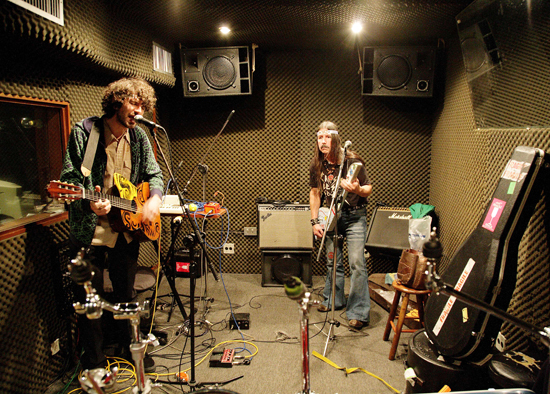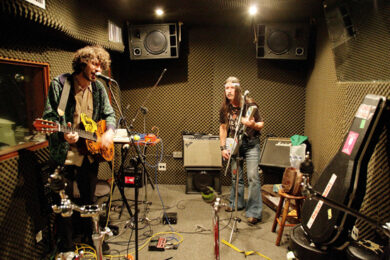When Gruff Rhys strikes out alone, the results ordinarily represent a comparative oasis of sanity from his oft-costumed acid-fried day job in Welsh psych-pop heroes Super Furry Animals. The two highest-profile examples of our assertions: the acoustic whimsy of 2007’s Candylion and, more recently, DeLorean-centric transatlantic sophisti-pop project Neon Neon. With his latest excursion, however, the pendulum of mentalism is definitely swinging in the opposing direction.
What we know so far about the Welshman’s current partner in harnessing the in sound from way out: Tony Da Gatorra is a cult Brazilian protest singer-slash-TV repairman who invented part guitar/part drum machine instrument curio the gatorra. Their collaborative album, The Terror of Cosmic Loneliness, released this week, is a mildly mindfucking headbands-and-psychotropics set of live jams. Dotted with fingerprints of eccentric multilingual genius synonymous with the Super Furries man, the unrelenting lo-fi rhythms of his South American friend lend a rather more challenging edge.
What we didn’t know, until now: Tony speaks about as much English as we do Portuguese. So when we corner the pair immediately before the first of two gigs in Gruff’s adopted hometown, Cardiff, at swell Welsh language-championing venue Clwb Ifor Bach, the interview is delayed two hours while we wait for an interpreter. Via such a disorientating medium, it somehow seems rude to enquire why, as we clock midway through conversation, Tony is missing an index finger. Although we can report his 21st Century hippy chic is a brightly coloured breath of fresh air.
Their first full run of shows together culminates in Saturday’s appearance at Field Day, warming up in Cardiff by playing their album from start to finish. To a backdrop of Gruff getting creative with a permanent marker, penning placards translating various snippets of Tony’s lyrics, while percussive support band Islet are in full raging flow on the floor above us, we probe further, attempting to avoid experiencing Cosmic Loneliness first hand en route…
Can you take us through how you first met?
Gruff Rhys: I was approached by a big promoter in Scotland in 2007, and they contacted people who do a cultural exchange between the UK and Brazil. [He pauses to grin at the noise of Islet erupting upstairs] They asked me ‘Would you be interested in working with anybody in Brazil?’ and I was a fan of Tony’s work, because I’d mixed an album in Brazil in 2006 and came across his work. They went ‘Oh yeah, we love Tony, we can definitely sort it out’. And they took me out to Sao Paolo for a week.
Were you aware of Super Furry Animals or any of Gruff’s projects before you met, Tony?
Tony Da Gatorra: No. The exchange was when I first met and got to know him.
What were your first impressions of each other?
TDG: I had a very good impression. He’s very human and I felt very honoured to meet with him because he’s a good person.
GR: Likewise. It was so easy, right from the beginning. It was lots of fun practising every day for about five hours.
Then you decided to record an LP while you were together and laid down all the tracks live?
GR: Yeah. Well, I regret that I added two harmonies. I promised myself I wouldn’t mess with the live recording because it captures the intensity. There was three or four takes of each song and it was a matter of choosing the best takes.
The album was recorded in 2007, so why is it only seeing the light of day now?
GR: I took the files back to Cardiff, gave them to [producer/auxiliary Super Furries musician] Kris Jenkins and his computer crashed. They were retrieved then I didn’t really know what to do with them. We didn’t mix it until two and a half, three years later.
With tracks in English, Welsh and Portuguese, but no shared tongue between the two of you, that old cliché about music being a common language certainly seems true here…
GR: Exactly. We can’t talk about much but we enjoy playing and making things.
TDG: The lack of language is no problem because we are able to communicate. I think Gruff speaks more Portuguese than I speak English.
GR: Which is saying something…
Initially it seemed as though subterfuge might be at work when it was announced you were doing an album with a Brazilian TV repairman, Gruff. Were you concerned that people might see this album not exactly as a crazy in-joke, but at least have a hard time ‘getting’ it, because Tony isn’t known in the UK?
GR: I’m not worried about it. It’s something I’m aware of, but I just got really, really attached to the recordings. There’s a character to them. But it’s not a pop record and I don’t expect everyone to understand it.
Many of the album tracks have the spirit of protest at their core: ‘O Que Tu Tem’ suggests that only prostitutes, black or poor people get jailed in Brazil, while ‘Eu Protesto’ tackles the country’s corruption. Was it your intention to make a protest record when you began working together?
TDG: Yes. Part of the CD is taken from some of my songs and this is all on protest, it’s a continuous protest about the inequality of the situation in Brazil and corruption. I am a protest singer.
How bad is the corruption in Brazil?
TDG: The corruption is not bad; it’s terrible. Sixty per cent of the people don’t have access to health and all those facilities you take for granted here. The taxes that the government collects they put away on offshore islands, it doesn’t go back into the economy, it just gets taken away, so corruption is really a big, big problem. Even my own father when he passed away was hungry. There was no food. Life is very difficult and very hard for the majority. I have a song that speaks about that, the many that have nothing and the few that have a lot.
One of the album tracks is, slightly cryptically, entitled ‘6868’. Does that number have a particular significance?
GR: It’s actually my pin number! It’s a kind of nursery rhyme so I remember it, but I’m going to have to change it now!
Can you explain the gatorra, Tony?
TDG: I’m an engineer in electronics and I designed the instrument. Because it has a part of a guitar that’s how I got ‘gatorra’, it kind of evolved from that. It doesn’t mean anything in particular.
How many exist? Do you make them for other people?
TDG: In total I have made 12 and some of them I have sold to bands like Franz Ferdinand and Cansei de Ser Sexy [CSS], they bought five. Some I sold in Sao Paolo and some where I live in Porto Alegre.
There’s a story that you were once banned by the Brazilian equivalent of the Musicians’ Union?
TDG: In 2006 I had a big gig in Sao Paolo. This organisation wanted me to stop, because I didn’t have a licence and because of what I was singing. These people have a track record of belonging to dictators and the establishment. One of my associates is a solicitor, so I took them to court. They wanted me to pay a licence. I said ‘No, no license’ and we fought. They gave me a fine but the fine was taken out and now I’m free to play wherever I want. This association doesn’t give us anything, they just collect this licence fee, so I’m not going to pay for nothing. They do nothing for me. Exploitation.
There’s a joking announcement on your website, Gruff, that these shows are protesting against [fictional] coalition government plans to ban all live music. Recent developments like attempts to axe the UK Film Council suggest their grip on the importance of culture is alarmingly out of touch – have you been worried by the change in government?
GR: Incredibly so, yeah. I mean it was pretty bad as it was, but it’s frightening to think it’s even worse now.
You grew up at a time when the last Tory government decimated Wales industrially and socially in the late 1970s and 1980s – did that shape your political views?
GR: Absolutely. I can never trust them. I think they have very elitist policies and it’s frightening really.
Do you think there are any cultural similarities between Wales and Brazil?
GR: We’re two great football nations [Gruff grins, wincingly; everybody else laughs, heartily]. And the Welsh are known as good dancers.
Are you looking forward to Field Day?
GR: Yeah, Field Day always has the most amazing line-up. I haven’t seen Caribou play their new album and I’m a huge fan. I saw their last tour 35 times or something, so I’m looking forward to hearing their new record live.
Apparently one member of Runners, among the other acts on the Village Mentality In Association With The Quietus Stage, appeared onstage with the Super Furries dressed in a bear suit during ‘The Man Don’t Give A Fuck’ in 1999…
GR: Amazing. Does that mean I have to return the favour? If I see a large bear being carried toward me…



